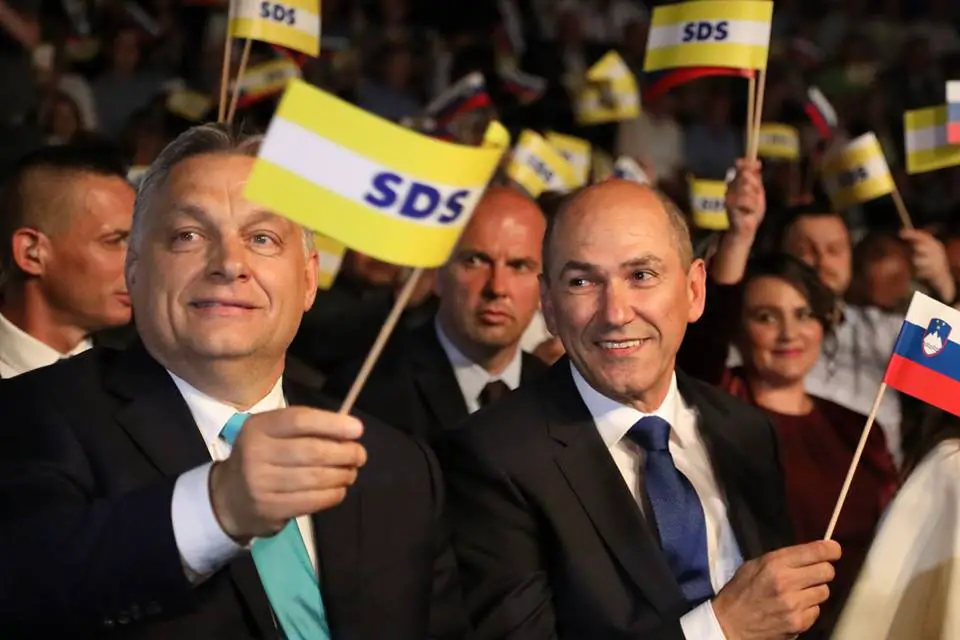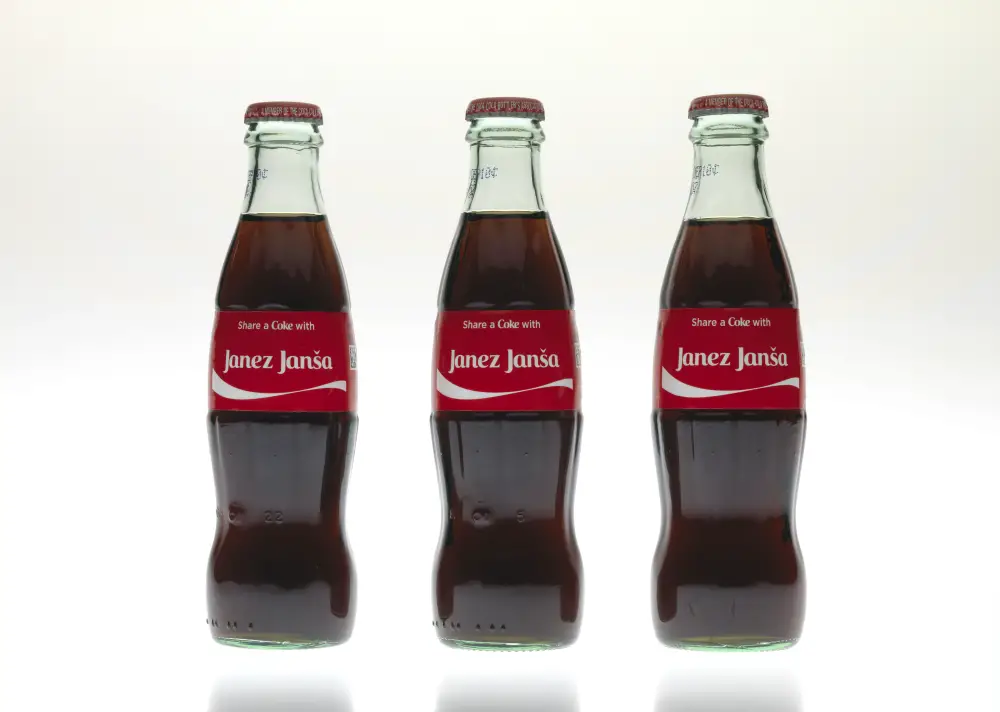STA, 3 March 2020 - Veteran politician Janez Janša, the long-time leader of the Democratic Party (SDS), has been appointed prime minister of Slovenia's 14th government, his third stint at the helm of the executive. His stable base of supporters finds him charismatic, capable and effective, his opponents say he is resentful and radical.
The 61-year-old has been at the helm of the SDS since 1993 and enjoys unbridled support among party members, having ran unopposed for the position of party leader for two decades and successfully deflecting all challenges to his primacy. Being the party's unrivalled leader, his political fortunes are inextricably linked with those of the SDS.
The party has been holding steady at or just below the top of party rankings for years. It won the 2018 general election but Janša was unable to put together a coalition because most parties refused to work with him, quoting the radical anti-immigrant rhetoric modelled on his close friend and ally, the Hungarian Prime Minister Viktor Orban.
After Marjan Šarec resigned as prime minister in late January, Janša got another chance, as leadership change at the Modern Centre Party (SMC) and the Pensioners' Party (DeSUS) made the former Šarec coalition partners less averse to working with Janša, and mindful of the uncertainty that a snap election brings.
His biggest success had been the 2004 election, in which the SDS got 29% of the vote. The SDS went on to build a stable government widely seen as capable, but also one that laid the groundwork for problems in final years of the economic crisis with policies that increased public spending even as they reduced government revenue.
Janša capped his first term by presiding the EU Council in 2008, and although his leadership was applauded across the EU, it was not enough to build up support domestically: in the 2008 general election, the SDS held steady at 29% but was overtaken by the Social Democrats (SD).
If the government serves out its full term Janša will do the cherished job once more as Slovenia is slated to preside the EU in the second half of 2021.
By 2008, Janša was also facing serious allegations of bribery from Finnish defence contractor Patria in exchange for a EUR 278 million purchase of armed personnel carriers, a transaction agreed in 2006.
The trial started in autumn of 2011, just months before Slovenia was about to hold the first snap election in its history and Janša remains convinced that the scandal was fabricated by his political rivals to undermine his chances of winning.
Despite his legal woes, the SDS came second in the 2011 election and Janša became prime minister once again in February 2012 after Zoran Janković, the head of the winning Positive Slovenia (PS), failed to put together a coalition.
The second time around Janša lasted only a year in the prime minister's office, but the policies adopted during that term had profound consequences as the government introduced a number of austerity measures in the wake of the 2008 economic and financial crisis.
The measures were in line with the dominant economic thinking at the time, which focused on the soundness of public finances, but in retrospect they have come to be seen as having contributed to the sluggish recovery of the economy by depressing demand due to wage cuts in the public sector and trimming of investment spending.
The government collapsed after all coalition partners, with the exception of New Slovenia (NSi), left in the wake of accusations by the Commission for the Prevention of Corruption about assets Janša could not account for.
In the Patria trial, Janša was found guilty of corruption by the court of first instance and went to jail for several months in 2014 before being released after the Constitutional Court ordered a retrial. The case became statute-barred before a retrial could begin.
While he was in prison, his supporters held regular weekly protests in front of the Ljubljana Courthouse, criticising the judiciary and portraying Janša as a victim of the system.
The protests created a strong grassroots movement that Janša has been able to count on to support his policies and ideas. They were also a manifestation of a long-held belief, going back to the time when he, then a journalist for the weekly Mladina, was first arrested in the late 1980s for divulging classified information, that the "deep state", remnants of the Communist-era centres of power, is dead set against him.
Janša's supporters see him as a strong fighter against remnants of the old political forces. A large part of the public, in particular voters on the left, see in him a shrewd political strategist and demagogue who is very good at playing into the fears of voters, does not chose his means, and continues to deepen divisions in society.
Despite being in prison in the aftermath of the Patria trial at the time, Janša was once again elected MP in 2014, with the SDS coming second to the then newly established Miro Cerar Party (SMC), which was later renamed the Modern Centre Party and will now be a partner in his coalition.
By 2016, cracks had started to show in the SDS, as several senior members had left the party, among them Janša's former Interior Minister Dragutin Mate and long-serving Foreign Minister Dimitrij Rupel.
The latter, when he left in 2015, said that Janša had deemed him "not orthodox enough", while Mate said that the party's internal democracy had declined.
In terms of relations with foreign politicians, Janša seems to be close to Orban, while he borrowed the slogan Slovenia First for the 2018 election from US President Donald Trump. And like Trump, Janša likes to communicate via Twitter, where he has more than 50,000 followers, more than any other Slovenian politician.
While the judiciary has been a persistent target of criticism by the SDS and Janša, their relationship with the media is testy as well. The most recent wave of criticism came following reports that two media outlets launched by the SDS, ostensibly to counter unfair coverage by mainstream media, had received funding from Hungarian businesses close to Orban.
The SDS has denied allegations that the financial transactions amounted to illegal funding for the party from abroad, and it has dismissed criticism that the Hungarian money makes Janša and the SDS beholden to Orban.
This alleged funding took place after the SDS found itself in crossfire in late 2017 for taking out a EUR 450,000 loan from Dijana Đuđić, an entrepreneur from the Republic of Srpska. The party immediately repaid the loan after this made the news.
Janša was born on 17 September 1958, he graduated in defence sciences in 1982. Soon after, he became the head of the defence commission of the then Association of Socialist Youth of Slovenia, starting to criticise the authorities.
In the 1980s, he was a writer for the weekly Mladina, and was arrested in 1988 and court-martialled on suspicion of leaking military secrets. The protests that accompanied the trial of Janša and three other co-defendants are seen as one of the key milestones in Slovenia's path to independence.
In 1989, he was one of the co-founders of the Slovenian Democratic Alliance, a predecessor of the SDS and one of the first opposition parties in Slovenia. He became a member of the National Assembly in 1990 and is the only MP who has been elected in every single general election since then.
He served as defence minister in successive governments in the early 1990s, including during Slovenia's ten-day independence war in 1991, until he was sacked as a result of a high-profile dispute over the use of military force against a civilian, and in 2000, during the short-lived government of Andrej Bajuk.
Janša has authored several books. His best known works deal with his early political career in the 1990s and the political situation at the time, while in recent years he has also tried his hand in fiction. While in prison in 2014, he wrote the historical novel Noric Kingdom, which imagines an ancient kingdom on present-day Slovenian lands.
He has four children, two with his first wife and two with his current wife, and three grandchildren.
All our stories on Janez Janša are here





